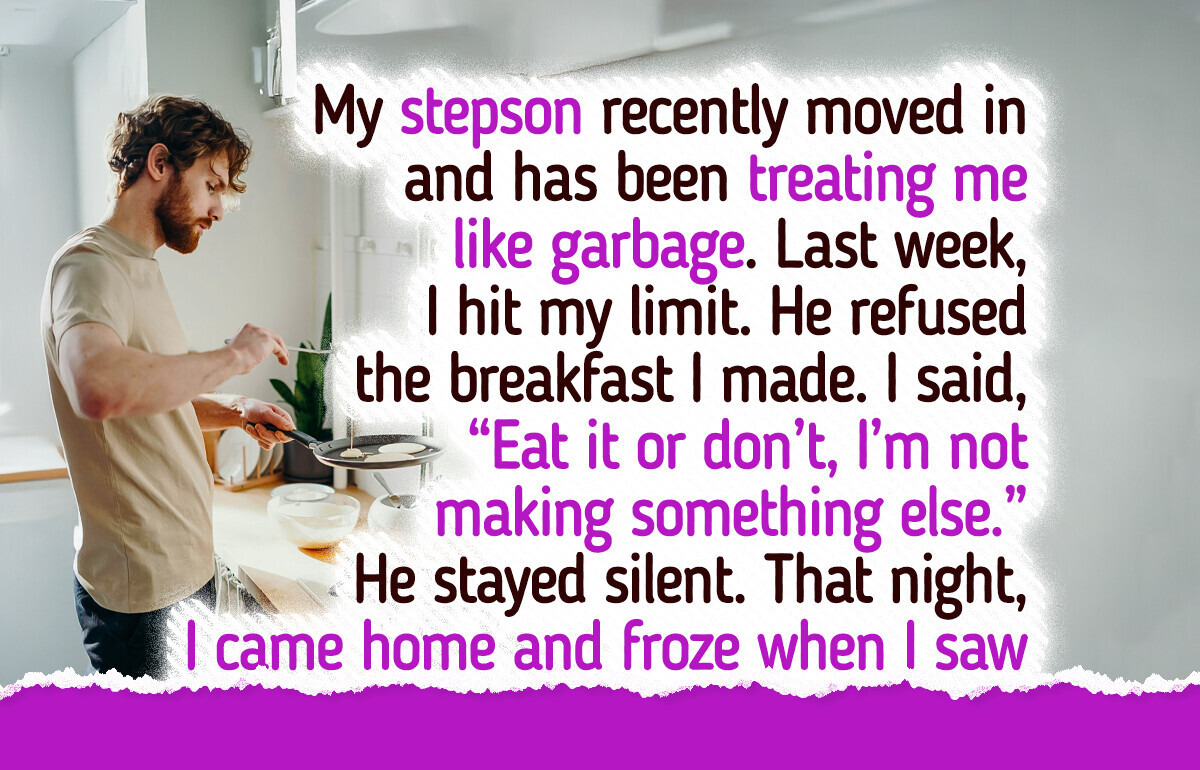Diforce her, and say out laud in front her child " This happens because of you, and what happen from yours previous father surely because your fault too"
I Refuse to Be My Wife’s Son’s Personal Chef, I Am Not His Father Anyway

When you open your home to family, you expect a sense of warmth, support, and togetherness. But what happens when that expectation turns into frustration, resentment, and emotional exhaustion? This is the story of one stepfather who found himself at his wits’ end when his stepson refused to respect his efforts, pushing him to set boundaries that changed everything.
Here’s his story:
I never imagined it would get this bad. When my stepson, Alex, moved in, I knew there would be an adjustment period. He was a teenager, a little rebellious, and dealing with the aftermath of his parents’ divorce. But I had always been the type to step up. I was there for my wife, Sarah, through thick and thin. I figured, “How hard could it be to support Alex through this rough patch?”
At first, it wasn’t too bad. I woke up early, as I always did, and made breakfast for myself—nothing fancy, just eggs and toast. But then, Alex started to complain and treat me like garbage. Every day. He’d say he didn’t like what I was making, that it wasn’t his “thing.” Fine, I thought. He’s a picky eater. I can handle this. So, I started making separate meals for him. Pancakes, cereal, waffles, anything to keep the peace.
But things quickly escalated, and I hit my limit. One morning, I made a big breakfast: scrambled eggs with bacon, some hash browns. A decent meal, right? I set the plate down in front of Alex, and he looked at me, scowling. “I don’t want this,” he said flatly. My patience snapped.
I told him, “Look, I’m not running a diner. I’m not going to make something different every day just because you don’t like it. Either you eat what I make, or you don’t eat at all.”
That night, I came home to a mess that made my blood boil. The kitchen was a disaster. Boxes of cereal were scattered, and pancake mix splattered everywhere. Alex had raided the kitchen while I was out. And to top it off, Sarah stood there, giving me that look. “Now you shouldn’t have a problem making what he wants, right?”
It hit me hard. Apparently, Alex had told Sarah I “let him starve.” I was floored. How did we go from making a simple breakfast to being painted as the villain?
I tried to keep my cool, but the words came out before I could stop them. “I’m not running a diner, Sarah. If you’re so worried, maybe you should wake up early and take care of him yourself. I’m done.”
I knew I had crossed a line, but at that moment, it felt like the only way to protect myself from the constant barrage of disrespect. I stormed out, leaving Sarah and Alex in silence. Now, I don’t know how to react.
Thank you for sharing your story with us.
Stepparenting can be a sensitive and challenging journey, and we understand the frustration that comes with it. To support you and others who might be facing similar situations, we’ve gathered some advice that we believe could offer helpful guidance.
1. Don’t encourage what makes you uncomfortable from the start.
One of the most important lessons here is setting clear boundaries from the beginning. It’s easy to fall into the trap of trying to be everything to everyone, especially in a new family dynamic. But the sooner you communicate your limits, whether it’s in cooking, chores, or emotional support—the easier it will be to avoid resentment.
2. Speak Up When You’re Frustrated
It’s tempting to hold your feelings in and keep the peace, but when frustration builds, it’s important to address it directly. While it’s critical to maintain respect, speaking up can clear the air and prevent a small issue from turning into a bigger one. Let your family know when something isn’t working for you.
3. Consider the Bigger Picture
In moments of tension, it can be easy to focus on the immediate problem. But sometimes, stepping back and looking at the larger picture can help guide your decisions. Alex might not have been the issue; it was his refusal to respect the boundaries that led to the bigger problem. Ask yourself: Is this about me, or is this about the unhealthy dynamics at play?
4. Respect Is Essesntial in Any Relationship
No matter how challenging the situation gets, remember that mutual respect is the foundation of any relationship. If that respect isn’t reciprocated, it’s okay to reevaluate how much you’re willing to give. You are not obligated to take on more than you can handle, and you deserve to be treated with the same care and understanding you give others.
Inheritance disputes often reveal hidden tensions, especially when family boundaries are tested in unexpected ways. Sometimes, it takes a bold decision—like refusing to include a future sister-in-law’s child in your family’s legacy—to spark a conversation that no one saw coming. Dive into this story that challenges the very definition of “family.”
Comments
Related Reads
I’m Done Handing Out Money to My Ungrateful Family—Inheritance Denied

20+ Moments That Prove Happiness Is Not About the Big Things

I Refused to Do Extra Work Without a Raise — Now HR Will Cut My Salary

I Refused to Help My Homeless Mom After She Spent All My Inheritance on My Sick Sister

13 Stories of Quiet Kindness That Show Superhuman Strength in Ordinary People

14 Heartwarming Stories That Prove Kindness Conquers All

I Refused to Knit My Coworker a Free Blanket, and Now HR Is Involved

16 Times Roommate Situations Took an Unexpected Turn

12 Moments That Show Kindness Is a Silent Superpower

I Chose My Sick Son Over a Client Meeting—Now I’m Under Review

I Started Leaving at 5 PM Sharp, Now My Boss Questions My Dedication

15 Stories That Inspire Us to Stay Kind Even When Life Feels Unfair







